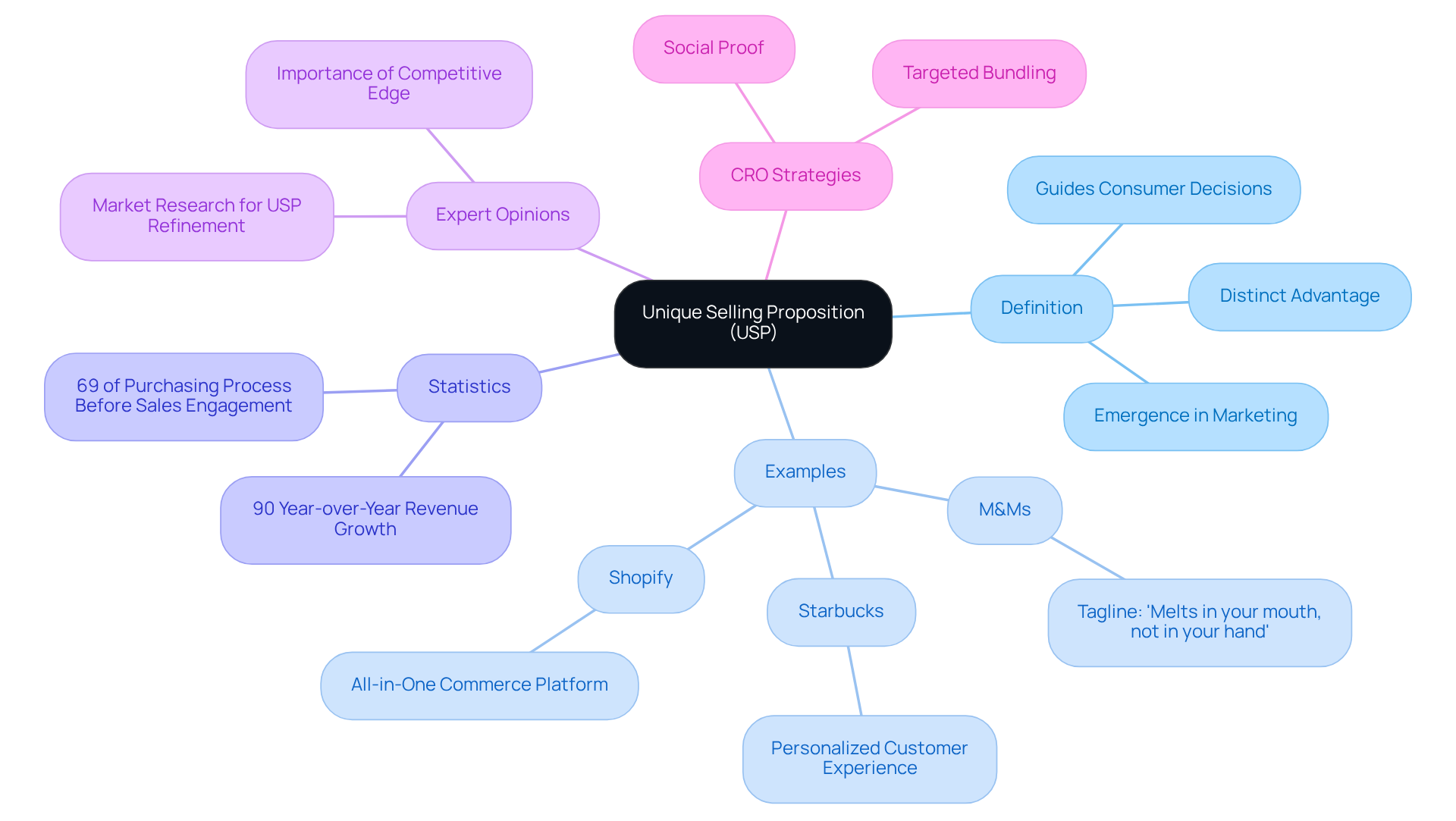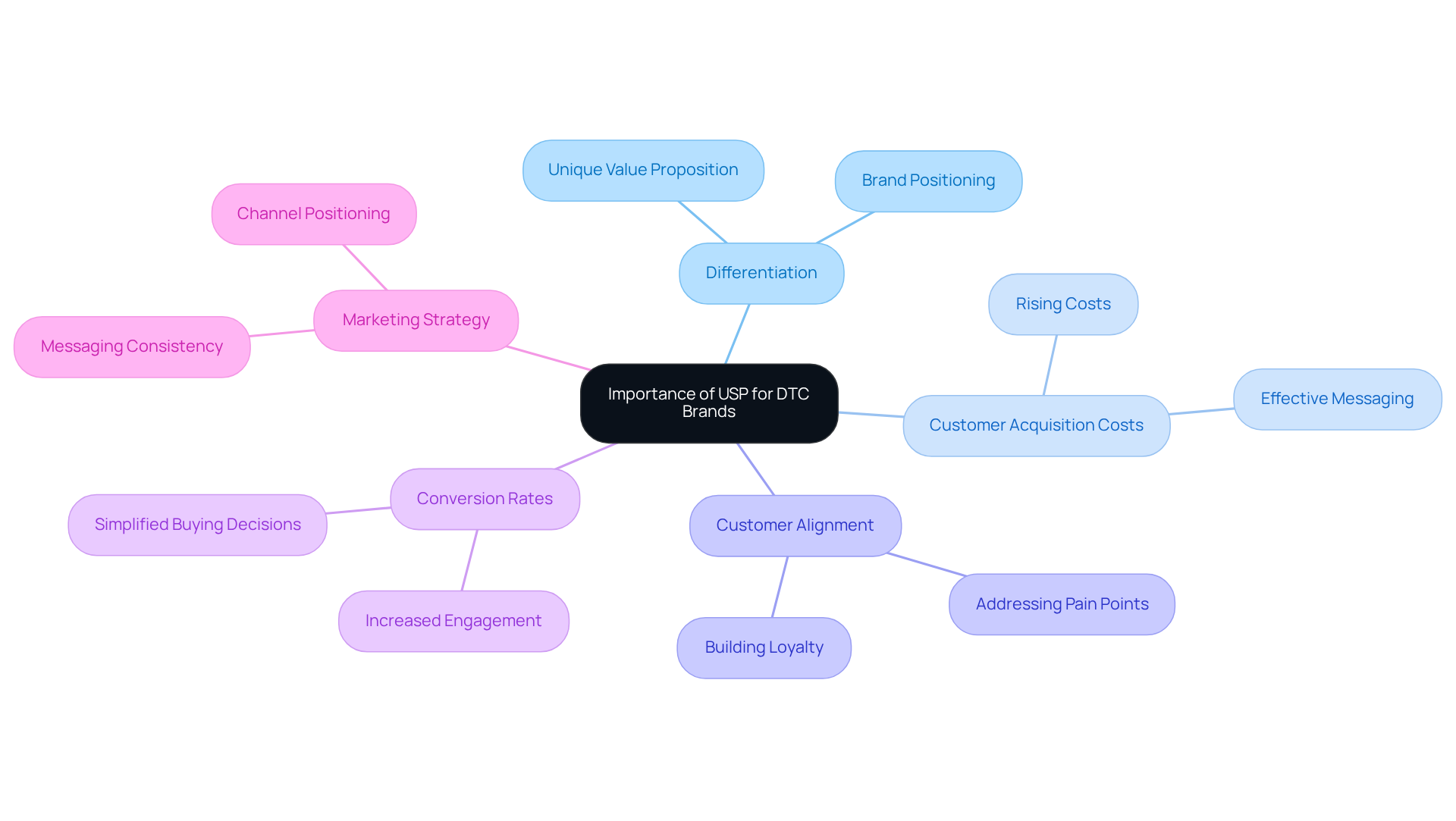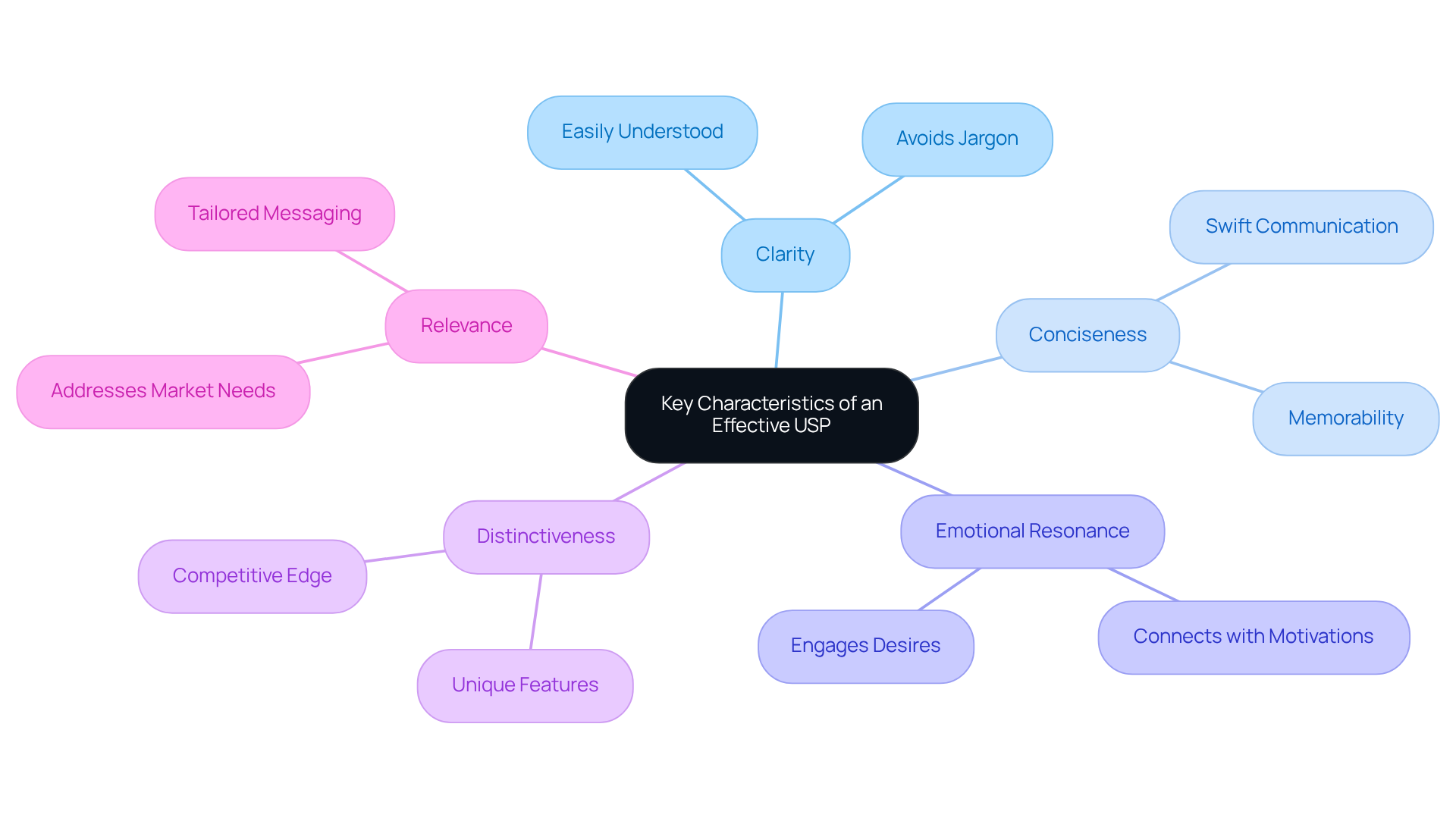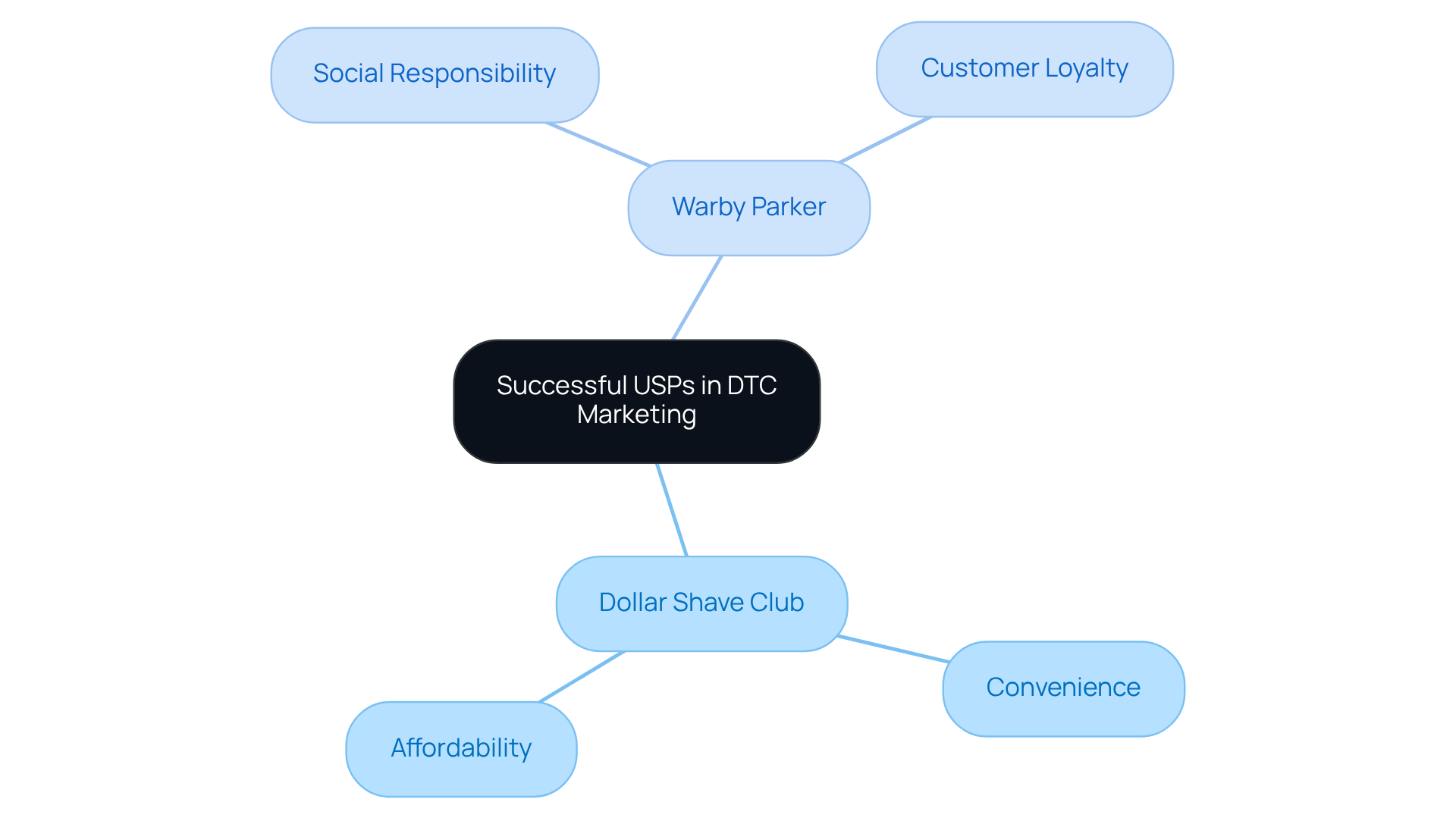
Overview
The article defines a Unique Selling Proposition (USP) in marketing as the distinct advantage or benefit that sets a brand apart from its competitors. This distinction is essential for attracting and retaining customers, particularly for direct-to-consumer (DTC) brands. A well-defined USP not only clarifies a brand's unique value to consumers but also significantly enhances conversion rates and drives sustainable growth. This assertion is supported by successful case studies and statistics that demonstrate the impact of a strong USP on business performance.
Introduction
In an era characterized by abundant consumer choices and fierce competition, the Unique Selling Proposition (USP) stands as a pivotal element for brands seeking to capture attention and cultivate loyalty. This concept not only delineates what distinguishes a product or service but also aligns intricately with the needs and desires of the target audience.
As direct-to-consumer (DTC) brands navigate increasingly saturated marketplaces, the challenge emerges:
- How can they craft a compelling USP that resonates profoundly with consumers?
- What strategies can DTC companies employ to effectively communicate their unique value and drive sustainable growth?
Define Unique Selling Proposition (USP) in Marketing
A Unique Selling Proposition (USP) represents the distinct advantage or benefit a brand offers, effectively setting it apart from competitors. In marketing, the USP definition articulates what makes a product or service unique and compelling, helping to guide consumers in their purchasing decisions. This concept emerged in the mid-20th century as marketers aimed to establish a foothold in increasingly crowded markets. The USP definition is essential as it not only showcases unique product features but also aligns with the needs and aspirations of the target audience, making it vital for effective marketing strategies.
Successful DTC companies exemplify the power of a robust USP. For instance, M&Ms' tagline, 'Melts in your mouth, not in your hand,' highlights its unique characteristic, resonating with consumers and fostering loyalty. Similarly, Starbucks sets itself apart by personalizing customer experiences, cultivating a sense of community that enhances engagement and loyalty.
Statistics further emphasize the significance of a clearly defined USP in driving business success. Research shows that sales organizations with a well-articulated USP achieve 90% year-over-year revenue growth, illustrating its impact on financial performance. Additionally, 69% of the purchasing process occurs prior to B2B buyers engaging with sales, underscoring the necessity of a strong USP to capture consumer interest early in their decision-making journey.
Parah Group's case studies illustrate how effective conversion rate optimization (CRO) strategies can enhance a company's unique selling proposition (USP). For example, a $30M apparel company experienced a 35% increase in conversion rates after implementing strategies that emphasized social proof and optimized product pricing, directly strengthening its USP. Similarly, Grab Green, a $15M cleaning product company, boosted its average order value (AOV) by 80% through targeted bundling and pricing strategies, further enhancing its unique value proposition. These outcomes demonstrate that a compelling USP, supported by data-driven CRO strategies, can significantly impact profitability and growth for DTC companies.
Expert opinions reinforce the importance of the USP in effective promotional strategies. A well-crafted USP not only drives tangible results but also helps companies connect with their audience on a deeper level. By clearly communicating their unique value using the USP definition in marketing, businesses can cultivate customer loyalty and differentiate themselves in competitive markets. Furthermore, market research is crucial for companies to analyze competitors and refine their USP, ensuring it resonates with the target audience. Ultimately, understanding the USP is vital for DTC companies aiming to strengthen their market position and drive sustainable growth.

Importance of USP for DTC Brands
In the competitive landscape of direct-to-consumer (DTC) businesses, understanding the USP definition marketing is not just beneficial; it is essential for differentiation. With customer acquisition costs on the rise, a distinct USP enables companies to articulate their unique value effectively, attracting potential clients while fostering loyalty. By aligning with customer values and addressing specific pain points, a well-defined USP significantly enhances conversion rates. This alignment simplifies buying decisions for customers, increasing their likelihood of engaging with the company.
Ultimately, a strong USP definition marketing serves as the cornerstone of a DTC brand's marketing strategy. It shapes messaging and positioning across all channels, driving sustainable growth. The importance of a robust USP cannot be overstated; it is the foundation upon which successful DTC brands build their presence in an increasingly crowded marketplace.

Key Characteristics of an Effective USP
A compelling Unique Selling Proposition (USP) exemplifies the USP definition in marketing by embodying several critical characteristics: clarity, conciseness, and emotional resonance.
- Clarity is paramount; it ensures that the USP is easily understood by the target audience, steering clear of jargon or overly complex language.
- Conciseness is equally important, allowing the USP to be communicated swiftly, which aids memorability.
- Moreover, a compelling USP must connect emotionally with buyers, engaging their desires and motivations.
- It should also be distinctive, showcasing features that competitors lack, and relevant, addressing the specific needs of the target market.
Studies show that 68% of shoppers state a product's distinct value proposition greatly affects their buying choices, especially in competitive sectors. By focusing on these characteristics, DTC companies can create USPs, according to the USP definition in marketing, that not only attract attention but also drive conversions efficiently.

Examples of Successful USPs in DTC Marketing
Numerous direct-to-consumer companies have effectively harnessed their unique selling propositions (USPs), in line with the USP definition marketing, to stand out in a competitive landscape. A prime example is Dollar Shave Club, whose USP centers on convenience and affordability. By offering high-quality razors sent straight to buyers at a considerably reduced price compared to conventional retailers, they have effectively drawn a devoted customer base. Similarly, Warby Parker distinguishes itself through a strong commitment to social responsibility, pledging to donate a pair of glasses for every pair sold. This appeal to socially conscious consumers not only improves their image but also cultivates customer loyalty.
These examples emphasize the essential function of the USP definition marketing in connecting with target audiences, ultimately fostering loyalty and enhancing conversion rates. By articulating their unique benefits clearly, these brands have secured substantial market share within their respective sectors, demonstrating the power of effective marketing strategies in the DTC space.

Conclusion
A well-defined Unique Selling Proposition (USP) is paramount for DTC brands striving to establish a distinct identity in a competitive marketplace. By emphasizing what differentiates a product or service, a robust USP not only attracts consumers but also cultivates loyalty, thereby driving sustainable growth. Effectively understanding and articulating the USP can profoundly influence purchasing decisions, making it an indispensable element of any marketing strategy.
Key insights shared throughout this article underscore the importance of a compelling USP. Successful DTC brands such as Dollar Shave Club and Warby Parker exemplify how a strong USP resonates with target audiences, enhancing customer engagement and boosting conversion rates. Characteristics such as clarity, conciseness, emotional resonance, and distinctiveness are essential for crafting an effective USP. Furthermore, data-driven strategies, including conversion rate optimization, can amplify a brand's unique value proposition, leading to remarkable financial results.
In conclusion, the importance of a well-articulated USP transcends mere differentiation; it is a foundational element that shapes marketing strategies and propels success for DTC brands. Companies are strongly encouraged to invest time in refining their USPs through thorough market research and consumer insights, ensuring they resonate with their audience. By doing so, brands can not only capture attention but also foster enduring relationships with their customers, ultimately solidifying their position in the market.
Frequently Asked Questions
What is a Unique Selling Proposition (USP) in marketing?
A Unique Selling Proposition (USP) represents the distinct advantage or benefit a brand offers, setting it apart from competitors. It articulates what makes a product or service unique and compelling, guiding consumers in their purchasing decisions.
When did the concept of USP emerge?
The concept of USP emerged in the mid-20th century as marketers sought to establish a foothold in increasingly crowded markets.
Why is a USP important for marketing strategies?
A USP is essential because it showcases unique product features and aligns with the needs and aspirations of the target audience, making it vital for effective marketing strategies.
Can you provide examples of successful companies with strong USPs?
Yes, M&Ms uses the tagline "Melts in your mouth, not in your hand" to highlight its unique characteristic, while Starbucks personalizes customer experiences to cultivate a sense of community, enhancing engagement and loyalty.
What impact does a well-defined USP have on business success?
Research indicates that sales organizations with a well-articulated USP achieve 90% year-over-year revenue growth, highlighting its significant impact on financial performance.
How does the purchasing process relate to USP in B2B contexts?
In B2B contexts, 69% of the purchasing process occurs before buyers engage with sales, emphasizing the necessity of a strong USP to capture consumer interest early in their decision-making journey.
How can conversion rate optimization (CRO) strategies enhance a company's USP?
Effective CRO strategies can strengthen a company's USP by emphasizing social proof, optimizing product pricing, and utilizing targeted bundling, which can lead to increased conversion rates and average order values.
What role does market research play in refining a USP?
Market research is crucial for analyzing competitors and refining a USP, ensuring it resonates with the target audience and effectively differentiates the company in the market.
How does a well-crafted USP affect customer loyalty?
A well-crafted USP drives tangible results and helps companies connect with their audience on a deeper level, cultivating customer loyalty and differentiating them in competitive markets.
FAQs











